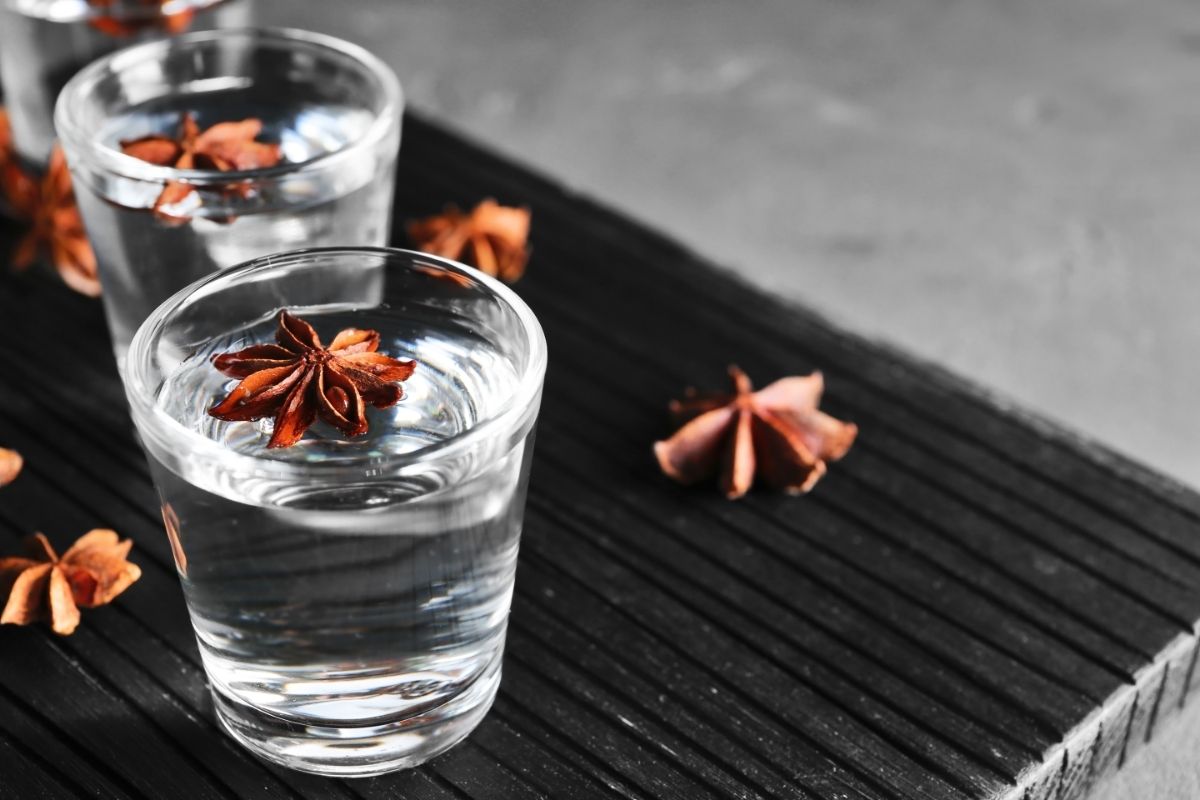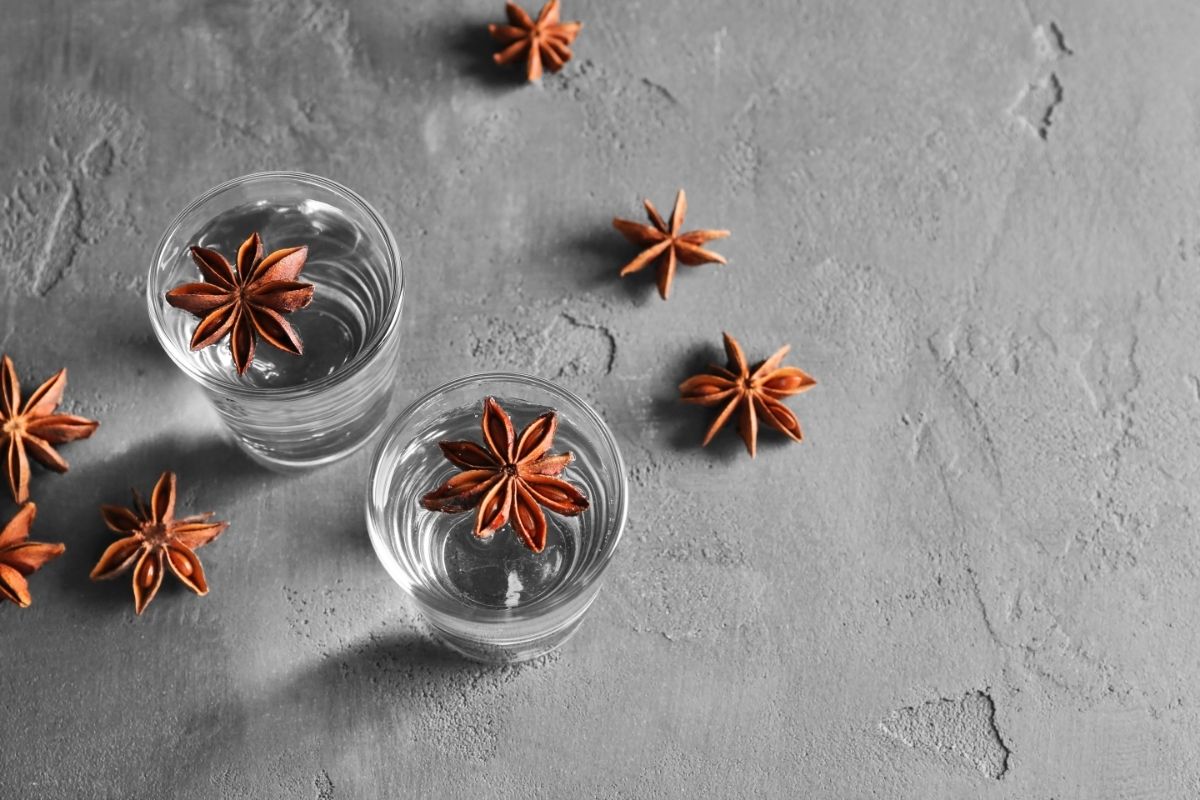The Anise Tasting Liquor
Many people use anisette in their recipes but have very little knowledge. What is anisette? Anise liqueur is an alcoholic beverage with aniseed flavor or star anise. Most of these liqueurs are transparent and have a distinct black licorice flavor.
Different nations around the world produce anise-based liquors. You can serve them in various ways, including plain and on ice. In addition, some cocktail recipes may contain anise liqueur, notably those you light on fire.

What is Anisette?
Anisette is an anise seed-based liquor. It has a sweet flavor that is reminiscent of black licorice. Although various forms of anise liquor are available worldwide, they originate in France and are prevalent in Mediterranean nations such as Italy, Spain, and Greece. You can serve it straight, dilute it with water or add it to other mixed beverages.
Anisette is a replacement for absinthe, an alcoholic beverage with anise seed as the main ingredient. Several parts of the world prohibit Absinthe due to its high alcohol level. Anisette liqueur is available in various brands, including Sambuca, Marie Brizard, and Ouzo.
Anisette has a flavor similar to black licorice, even though it does not include any licorice. The manufacturing of Anisette is from the seeds of the anise plant, which is a parsley-like plant that grows wild in the Mediterranean.
Although different variations of Sambuca can be yellow, red, or green, the liqueur is usually clear. However, it might take on a yellowish, milky appearance when serving it diluted with water.
Anisette is the earliest of various anise-flavored liqueurs, including Absinthe, the well-known green liqueur that has been on restriction in many nations for years.
On the other hand, Anisette is a neutral spirit with anise plant flavor, which belongs to the parsley (Apiaceae) family and other herbs and spices, such as coriander. Like most anise-flavored liqueurs, it will be hazy when adding water to the anisette.
Although you can consume an anisette on its own, there are a variety of anisette cocktail recipes to try.
People occasionally mistake Anisette for anis, a type of anise-flavored alcohol. However, anisette falls into the broader category of anise-flavored liqueurs or liqueurs d’anis. You do not usually refer to it as anis because the drier anise liqueurs, such as pastis (named after Ricard Pastis, a maker of original absinthe), ouzo, and arak, are generally the drier anise liqueurs.
They also prefer to utilize star anise seeds rather than natural anise seeds. Star anise is less expensive than Pimpinella anisum, or real anise, although it can be inferior. In the star anise fruit seeds, you can find the significant flavor ingredient of anise, anethole.
You can prepare Anisette by distilling the anise seeds with a spirit or macerating the seeds in the spirit, just like any other anise liquor. Anisette has a licorice or fennel flavor and is sweeter than other anise liqueurs like the anis, as mentioned earlier, or pastis.
On the other hand, European products are often much less sweet than American ones, which can be syrupy. Anisette is also less alcoholic than most others, with a volume alcohol content of only 25%.
Anisette is one of the first commercial production liqueurs. Its introduction was in 1755 by the Marie Brizard spirit firm.
Anise is a medicine that works effectively according to the ancient Egyptians, Greeks, and Romans. It was also effective for headaches, malignant growths in the nasal passages, as an expectorant (when you mix with honey), and to help with digestive issues including gas, intestine gripping (cramps), etc.
What can be Used as a Substitute for Anisette Liquor?
Here are some of the best anise replacements that won’t overpower your cuisine.
Pernod – An Excellent Anise Extract Substitute
Pernod is an anise-flavored beverage, a Pernod production. Because extracts contain alcohol, you can use Pernod as a substitute for anisette. This sweet-flavored alcoholic beverage will give your dessert frosts the same results as any high-quality anise extract.
If you already have Pernod in your kitchen for drinking or other cooking uses, you might use it to replace anisette.
Anise Liqueur is a Close Substitute for Anisette
Anisette is a brand name for anise-flavored liqueurs. They are colorless and pleasant in taste, with licorice flavors similar to anise extract. Anise liqueurs or anisette are excellent substitutes for anise extract because of their licorice tastes and slight sweetness.
There’s no chance you won’t get the same outcome if you use half the amount of anisette instead of anise extract. Anisette’s are a good and simple alternative to anise extracts.
Anise Spirits Are a Good Substitute for Anise Extract
Anise spirits are often sweeter than anise extract and anisette. If you want the sweet flavors to take center stage in your meal, you should use a larger amount of aniseed spirit in your recipe. However, make sure the amount you ingest isn’t excessive.
In general, anise spirits are an acceptable substitute for anise extract. You should think about them, especially if you have them in your pantry.
Licorice Flavoring and Extracts
The flavor of licorice is intense and sweet. It is available in black licorice alcohol flavorings and extracts and is widely accessible in the marketplace. Because licorice flavors predominate in anise extracts, licorice extract can be a near alternative.
Vanilla Extract Is The Easiest Anise Extract Substitute
If you don’t mind the anise extract’s too sweet and overpowering flavors, vanilla extract can be a hassle-free and straightforward substitute for anisette liquor. It’s possible that you already have vanilla extract in your kitchen.

How is Anisette Made?
To prepare Anisette, you use a mixture of neutral spirit and sugar syrup is macerate (or soak) various plants and seeds. Then, distillation takes place until it reaches a concentration of around 25% alcohol by volume, though certain kinds have a higher concentration.
This anise liqueur has a smooth, sweet taste due to its sweetness and low alcohol concentration, making it a favorite after-dinner drink.
Do you know how the dumpling is the great equalizer in the food world since it appears to exist in practically every culture? Anise spirits are the spirits world’s version of that. However, when you start looking around, you’ll notice that there’s much more to it than just sambuca.
Anise derives from the Pimpinella anisum plant, which has long, stalky stems that yield white flowers from which the seeds form.
It’s one of the earliest known culinary herbs, hailing from the Levant (a historical phrase referring to what is now Israel, Jordan, Lebanon, Palestine, and Syria) and was a Roman-era favorite in sweets and other dishes; according to “The Oxford Companion to Food.
What about star anise, for example? That is, in fact, the fruit of a magnolia tree native to southeastern China.
Because both contain the essential oil anethole, which gives that unmistakable spicy, pungent licorice-like herbaceous flavor and the ability to turn a liquid from transparent to opaque with a drop of water or the addition of an ice cube, the resulting flavor is nearly interchangeable with aniseed.
A variety of countries and places worldwide develop their spirituous anise expression.
Ways to Serve Anisette
You can serve Anisette in a variety of ways. Some individuals prefer it to chill or serve over ice, while others prefer it straight at room temperature. Others combine it with water and use it in various cocktails, such as the Dubonnet royal and Russian roulette.
Sweetening coffee is occasionally with a sweet-tasting spirit. You can also use it to make biscuits and biscotti due to its high sugar content.
Many folks prefer to drink anisette over ice. Anisette is a substitute for absinthe, an anise liqueur with a substantially greater alcohol level. Absinthe is restricted in many parts of the world because it causes hallucinations, though research shows this is not the case.
Absinthe production has been back in several world places since the 1990s, and various kinds are now available for purchase.
Health Benefits Associated With Drinking Anisette
It May Help With Digestion
Anise has carminative qualities, which help to reduce bloating. It may also increase the number of daily evacuations, and its laxative effect may aid in the treatment of constipation. Traditional Persian medicine uses Anise extensively to treat gastrointestinal issues.
Anise oil can help with symptoms like bloating, abdominal discomfort, constipation severity, defecation difficulties, and diarrhea, according to a study involving 120 individuals with irritable bowel syndrome (IBS).
Since ancient times, people have used anise to treat dyspepsia. It can help with bloating, fullness, and early satiety, among other things. Also, aqueous suspension (water-based) of anise can reduce gastric ulcers in rats. In addition, its anti-secretory and antioxidative properties can inhibit gastric mucosal damage and reduce acid secretion.
May Reduce Menstrual Pain
Anise can effectively reduce menstrual pain in the case of primary dysmenorrhea (pain in the lower abdomen that occurs just before or during menstruation). This is because anise has an antispasmodic property that relieves the involuntary contractions of muscles.
May Decrease Symptoms of Depression
Depression affects an estimate of more than 350 million individuals worldwide. Anise possesses antidepressant and anti-anxiety effects that help fight against depression. In one mice study, the alcoholic extract of anise effectively treated depression.
Also, anise oil is an effective remedy in relieving mild to moderate depression symptoms.
It may also help treat postpartum depression (a mood disorder after childbirth).
May Help Relieve Menopause Symptoms
Did you know that around 1.5 million women experience menopausal symptoms like hot flashes, vaginal dryness, fatigue, joint pain, insomnia, and decreased libido each year? Anise can relieve the frequency and severity of hot flashes in post-menopausal women.
Also, the essential oil of anise contains estrogenic agents like anethole that help alleviate menopausal symptoms. Such estrogenic activity may help manage bone density and prevent bone loss in postmenopausal women.
May Regulate Blood Sugar Levels
Anise seeds contain 50 potential anti-diabetic compounds that help maintain blood sugar levels. In addition, Anethole possesses anti-diabetic properties and helps treat several chronic diseases.
In one study by Annamalai University, India, on diabetic rats, trans-anethole has hypoglycemic activity and may help reduce high blood sugar levels by regulating the key enzymes in carbohydrate metabolism.
May Prevent Microbial And Fungal Growth
Anise fruit extract exhibits intense anti-fungal activities and acts against certain fungal species like Candida albicans, C. parapsilosis, C. tropicalis, C. pseudotropicalis, and C. krusei. In addition, the anise essential oil is also effective against certain yeasts and dermatophytes that may lead to infections.
The trans-anethole in anise oil exhibits anti-fungal properties. It can also be effective against multidrug-resistant toxigenic strain Vibrio cholerae O1 E1, which may lead to cholera.
Has Anti-Inflammatory Properties
Anethole, the main constituent in anise, possesses anti-inflammatory properties. This active medicinal compound works against periodontists (PD), a chronic inflammatory disease. As per one animal study, fixed oil of anise may exhibit an anti-inflammatory effect as strong as indomethacin (a nonsteroidal anti-inflammatory drug).
However, there is a need for more human studies to understand the anti-inflammatory effects of anise further.
May Help Prevent Bad Breath
The presence of small food parts or excess bacteria left inside your mouth causes bad breath or halitosis. As a result, a considerable number of the world population experiences bad breath. Anise can kill odor-causing bacteria in the oral cavity and act as a natural herbal remedy for bad breath.
May Help Treat Insomnia
In studies, the powder and concoction of anise in hot water effectively treated insomnia. Therefore, anise is an alternative natural remedy for patients with chronic insomnia. However, there is a need for more research to understand this benefit further.
Anise also offers certain other benefits, while no scientific evidence supports them. They are as follows;
- Treating asthma.
- Reducing cancer risk.
- Inducing weight loss.
- Preventing cataracts.
- Preventing early signs of aging.
- Increasing milk secretion.
- Reducing symptoms of male climacteric (male menopause).

Salute!
It’s easy to mix anisette up with pastis or other anise-flavored spirits, but it’s its liqueur category. In contrast to pastis, which has a high alcohol content of 40 to 45 percent, anisette has a lower alcohol content of 25 percent.
Anisette is sweeter than pastis and employs aniseed in the distilling process instead of pastis. Marie Brizard is one of the most well-known and widely available brands of this aniseed-flavored liqueur.
Anise and licorice share a similar flavor and fragrance; however, they vary in taste. Anise tends to be peppery and a touch sweet. On the other hand, licorice can be bitter, salty, and even sour.
They smell similarly because they both have anethole, an organic flavoring molecule. Anethole is present in star anise and fennel, which taste similar to licorice and anise.

Community of passionate writers and content creators who share a love for Italian heritage, culture, travel, food, and the Italian-American community. Our mission is to celebrate Italy’s rich history and traditions and connect with others who share the same passion.

